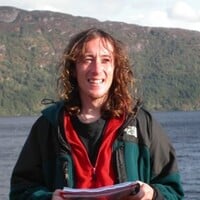Alasdair Skelton

I am Professor of Geochemistry and Petrology at Stockholm University. I research on and teach about climate change from a geological perspective and about the ongoing climate crisis.
Location Sweden
Activity
-
Alasdair Skelton replied to Dasi Moodley
This arguably stems back to Descartes (I think therefore I am). The parallel Descartes draws between the human mind and God (see Descartes correspondences with Queen Christina of Sweden) may have been a starting point for placing "human" above (and separate from) "nature" which underpins the crisis we are now in.
-
Alasdair Skelton replied to Paul Kamill
The starting point of the Anthropocene is not decided on. The reason for 1950 is a "nerdy" geological one. This is that a new epoch must be detectable in the geological record on geological timescales. Although one might expect the start of the Great Acceleration to be the reason for choosing 1950 it is not. Instead it is nuclear testing, which leaves behind a...
-
Alasdair Skelton made a comment
Thanks for all of these comments. And, Dennis, thanks for point out that there might be a problem with the calculator regarding transport. I will check this and update it if needed.
-
Alasdair Skelton made a comment
Great to see so many more good examples since I was last in. Regarding the Swedish wording, as I do speak Swedish, I can confirm that this is correct.
-
Alasdair Skelton made a comment
Thank you Antoine, This is a brilliant example of a positive feedback which is actually positive!
-
Alasdair Skelton made a comment
To those of you participating in this course, I am especially interested in your feedback about this simplified carbon footprint calculator. Our aim is to make it as simple as possible while still being useful. We will continue to improve it based on your comments.
-
Alasdair Skelton made a comment
I like the suggestion of volcanic eruptions. Although their effects are generally short-lived today, some researchers argue that volcanic eruptions triggered Snowball Earth (a time in Earth's history from ca. 720 to ca. 660 million years ago during which Earth might have been entirely glaciated). If Snowball Earth happened and if these researchers are correct,...
-
Alasdair Skelton made a comment
The role of precipitation in the weathering cycle is a great example of a negative feedback mechanism. Even vegetation can work in the same way as vegetation is both favored by higher temperatures and enhances weathering (which ultimately lowers temperature) by producing organic acids.
-
Alasdair Skelton made a comment
Thank you Maurice for pointing out the grammatical error. I will get this changed. Sorry!
-
Alasdair Skelton made a comment
Regarding loss of Arctic Sea Ice, I wrote a paper on this topic with some colleagues. We used a statistical approach to show an abrupt change to the climate around 1990. One possible explanation is loss of Arctic Sea Ice. An other is changes to the amount of particles we are emitting to the atmosphere in Europe. If anyone is interested the link is here (it's...
-
Alasdair Skelton made a comment
Great answers! Something else to think about is the different timescales of the fast and slow carbon cycles. Fossil fuel emissions are part of a cycle that takes hundreds of thousands of years. Trees are part of a cycle that takes tens of years. It is difficult to swap carbon between these cycles because of the differences in timescales.
-
Alasdair Skelton made a comment
These are great and inspiring examples. Thank you! Another way of looking at our emissions is that in 2019, our emissions were equivalent to creating a blanket of pure carbon dioxide, half a centimeter thick, and wrapping it around the entire planet.
-
Alasdair Skelton made a comment
Thank you for all these great suggestions! One point about atmospheric gases (which some of you suggest) is that those we release (e.g. by burning fossil fuels) have a different isotopic composition from those released naturally. Provided that these are stable isotopes (not radioactive ones like carbon-14 which decay quickly) an isotopic "finger print" will...
